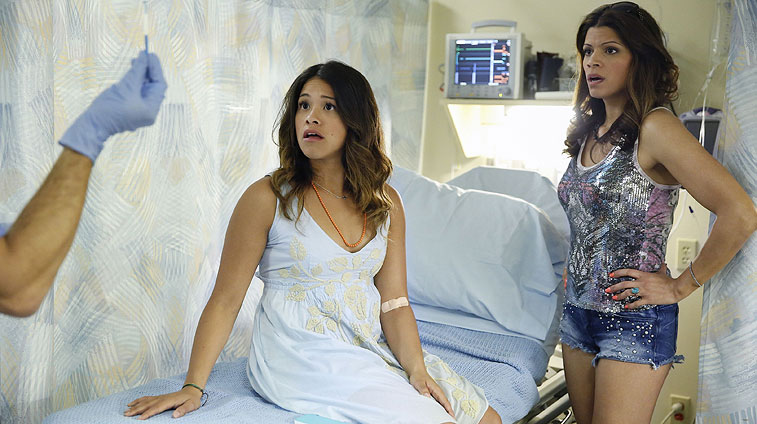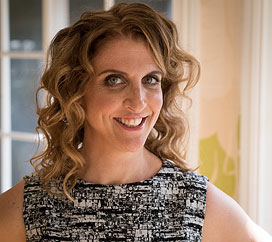
Latin Lover
Jennie Snyder Urman sends a love letter to telenovelas with Jane the Virgin, the CW's surging sophomore comedy about a virtuous, young Latina who is accidentally artificially inseminated by her doctor.
 Jennie Snyder Urman
Jennie Snyder Urman
I approach all my characters with depth and compassion I really protect them, I really love them, I really try to take care of them emotionally, so that's how I've navigated what could be a distance between the subject matter and me.
Jane the Virgin is undeniably a love letter to telenovelas, the twisty turny, limited run Latin soap operas popular the world over. In fact, the show, which is based on the 2002 Venezuelan seriesJuana la Virgen, gets the spirit of this quirky genre not to mention Latin culture in general so right that you'd think the series showrunner was Latina herself.
Only thing is, Jennie Snyder Urman is certainly not Latina.
So how does she maintain the integrity of the show? Well, she does have Latina writers on staff, including one who worked on telenovelas in Mexico, but more importantly, she doesn't focus on representing the Latin world as much as she focuses on representing her characters.
"I approach all my characters with depth and compassion," says Snyder Urman, whose resume also includes Emily Owens, M.D., Gilmore Girls, and 90210. "I really protect them, I really love them, I really try to take care of them emotionally, so that's how I've navigated what could be a distance between the subject matter and me; I find the places where we intersect. I find a lot more that I personally connect with about Jane than what I don't connect with about Jane."
Apparently, the technique is working. The show, in its freshman year, has already won a People's Choice Award for Favorite New TV Comedy, as well as a Golden Globe for Best Performance by an Actress in a Television Series Comedy or Musical for its lead, Gina Rodriguez.
Snyder Urman spoke with the Writers Guild of America West website recently about Jane the Virgin's depiction of Latin culture and how she is able to keep all of the show's multiple plots straight in her head.
The show is really self-reflexive with the superimposed text and the Latin lover narrator. Does that make the storytelling easier for you or is it challenging to maintain?
It's both. It's a whole other layer of storytelling that we get to employ. It really helps, because we get to cut right through exposition and if we want the audience to know something we can just say it in a cheeky way with the narrator or type on somebody's relationship to somebody else and put a few arrows. In that way, it helps us shortcut some of the more traditional challenges of exposition, but it's challenging in and of itself in that you don't want to keep repeating the same devices; you want to keep reinventing it and exploring what you can do with the texting and with the narration. And you don't want it to feel as though you're ruining exposition, you want it to feel fun, effortless, and part of the story and the storytelling.
Do you feel that you can incorporate more twists and turns in the plot because you have that safety net to remind the audience of the situation?
I can go faster through things than normal, and I wanted the show to have a really fast pace; I've always said I wanted people to be chasing after the plot and that it swings and turns. You always have to know that it's all coming out of character and keep the characters grounded, but I really wanted the plot to have its own engine. We can do so many more scenes in this show than I could do on other shows because I don't have to slow down to explain too much.
And when you're fleshing out the stories, how does it play into that? Do you flesh out the story and then come back to these devices and say, "How can we use this?" or is it in there the whole time?
It's all part of it. It's almost like when you think about the narrator, it's just another character. We always flesh out the stories, we break them really, really detailed and, once it's all broken and ordered, the room takes about a day and a half to talk through every scene in the episode. And as they talk through it I'm always looking for what's the interesting transition. Because our show is a lot about leaving one scene and you're saying, "He felt it to his core," and then the next shot will be of Raphael's core, his stomach. We're always looking for sort of clever transitions. A lot of it, writers find on the page and about 20 percent I add in editing.
Obviously there's a lot of Latino culture in the show, and it takes a few pokes at telenovelas. Given you're not Latina, is this a challenge to get right?
I don't feel like we're taking pokes. I've always said I feel like this is an homage to the telenovela, it's a love letter to the telenovela. We point out all the tropes, but we're also using them all and to me there's a reason why they're the most popular genre in the world, because there's romance and intrigue and sex and murder and twists and turns and really fun, full throttle storytelling.
I read a lot about telenovelas, I watched a few and then I really just came to it from a place of character, starting with Jane. Having her love telenovelas takes away the distance, takes away the "we're making fun of that" feeling. We approach it as "what great things can we exploit within the genre?" and how we can do it in a fun, interesting, quirky, whimsical way because our world is quirky and whimsical.
What about learning about the culture in general? If you made all these people Irish the show wouldn't make sense anymore, it works in that culture.
Yes and no. I had to familiarize myself with certain aspects of it but I also had to really think about the people and make them specific, because I feel like the more specific your characters are, the less they're going to be stereotyped. Yes, you want to know where the family is from and how they grew up versus how Jane grew up, but at the same time Jane was born and raised in America. But she's not an example of every Latina girl born and raised in America; she's an example of Jane Villanueva, daughter of Xio, granddaughter of Alba. I mean I definitely make sureabuela is Catholic and I make sure that my references there are on point and the foods that she brought over from Venezuela are specific all of those details I try to be really particular about but everything else it's just, it's a particular family, it's not an overarching look at a group of people.
How do you keep track of all the subplots?
We do about two weeks' worth of plotting at the beginning of the season and we stay pretty close to what we've decided on, and so it's all planned out. We really, really, really plan.
When you introduce these subplots, do you plan everything reaching a logical conclusion or do you introduce stuff maybe prepare for it to just wander away?
I don't let things wander. I really try not to. If we're introducing something I want to know how we're going to end it, what's going to be the payoff? Sometimes you're more successful than other times but we always talk about it first. If we're introducing Jane teaching in a Catholic school, what's going to be the end result of that three-episode journey, how is it going to affect Jane, how is it going to change her, how is it going to both affect her emotionally and affect our plot?
Are you thinking about binge watchers when you're creating the show, people who watch 21 episodes in a weekend and therefore catch loose plot ends and logic flaws?
I didn't think about it as specifically as that, but I'm very aware that people pay attention, and I try to assume that the audience is smart and that everything you put on screen, you're not going to flip away from it. I'm keeping track of everything in my head, so I really try to make sure if we're changing something we explain it and there's a real reason. I really try to give the audience credit that they are watching carefully, whether they're binge watching or not, they're really attaching to the characters and to their choices and decisions. We try to be really conscious of that in the writers' room as well.
It's all in your head? You don't have a bible or a big board or anything?
We have a big board, but I would say it's all in my head, yes.
Wow, kudos to you. I can't even remember to pick up my dry cleaning.
I've been living the show for a while. The amount of work that goes into every episode and every edit I know everything that's on the screen since I'm in there 60 hours a week just going through tapes and performances. I know the show very well.
One more question for you: is Jane writing the series?
Is Jane writing the series? There is a connection between the narrator and the narrative, but I'm not really willing to say. We need to explore that.
